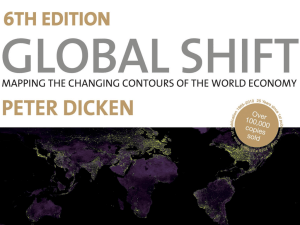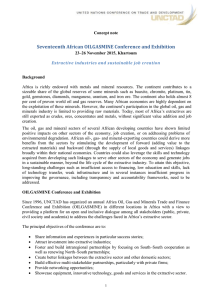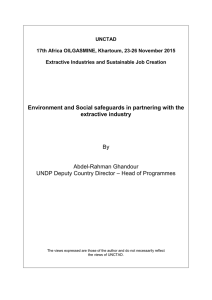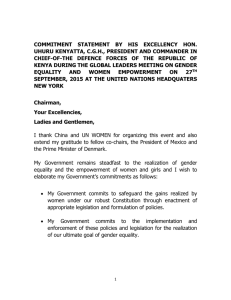UNCTAD 17th Africa OILGASMINE, Khartoum, 23-26 November 2015
advertisement
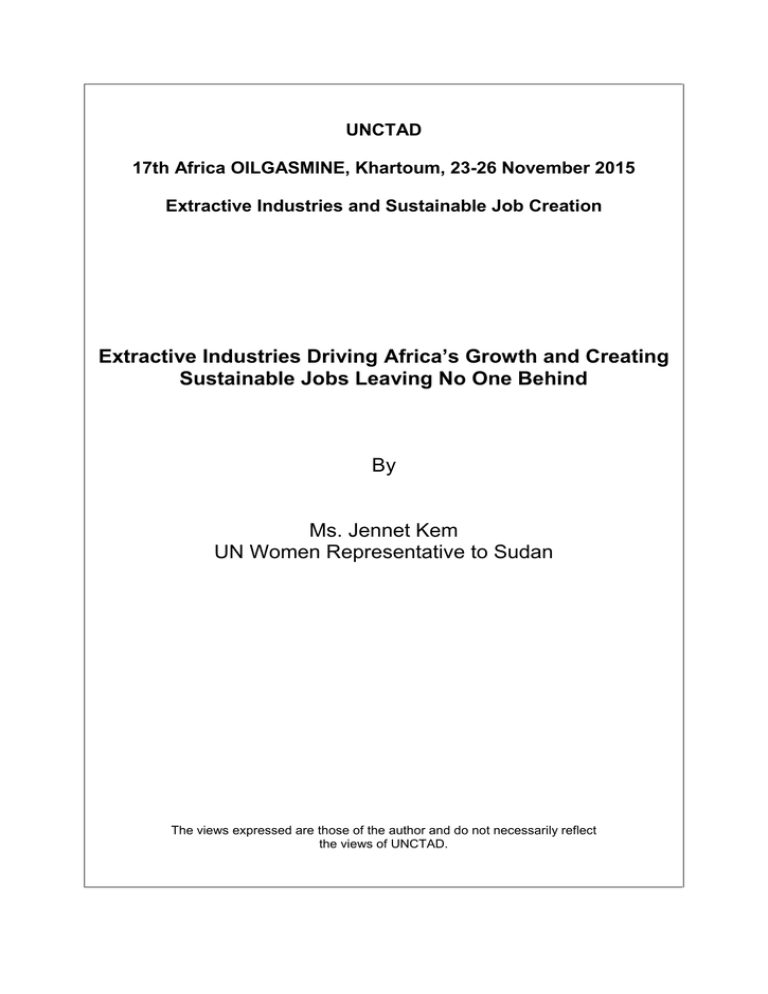
UNCTAD 17th Africa OILGASMINE, Khartoum, 23-26 November 2015 Extractive Industries and Sustainable Job Creation Extractive Industries Driving Africa’s Growth and Creating Sustainable Jobs Leaving No One Behind By Ms. Jennet Kem UN Women Representative to Sudan The views expressed are those of the author and do not necessarily reflect the views of UNCTAD. “Extractive Industries Driving Africa’s Growth and Creating Sustainable Jobs Leaving No One Behind” By: Ms. Jennet Kem, UN Women Representative to Sudan 26th November 2015 Khartoum-Sudan Outline of Presentation Key Message for UN Women Executive Director; • Why advocate for Gender Equality and Women's Empowerment in Extractive Industries? • Factors affecting Gender Equality and Women's Empowerment in Extractive Industries? • Proving impact and enhancing opportunities for women and girls in EI value chains • Confronting gender related huddles in EI • UN Women as a key player in advocating for GEWE in EI • Success studies from case studies • Way forward and Conclusion • Gender Equality in the Extractive Industries: Key Message from UN Women Executive Director “The extractive industries have the potential to drive immense economic and social development. However, it is vital that we consider how everyone is affected: women and men, and whole mining communities. If extractive projects are not inclusive and sustainable — including employment practices that are gendersensitive, and community investments that impact positively on gender equality and women’s empowerment — there are real risks to social stability, inclusive growth and development, and even security.” UN Women Executive Director Phumzile Mlambo-Ngcuka Why Gender Equality and the empowerment of women in EI Discovery of large-scale discovery of minerals and metals in Africa; EI main drive of most economies--but not often translated into jobs or household wealth; EI have the potential to step up women’s economic empowerment if transparent, fair and equitable Multiplier effects of women’s economic empowerment on other development gains like nutrition, health, education, sanitation, improved livelihoods; WEE=Smart Econs and pathway to GEWE Basic right of all members of related communities to participate and benefit from its resources; Engendering the EI responds to rights norms and principles; Gender bias in EI sector, if unaddressed, could further widen the gender gaps in access to resources and resource-related opportunities Significance of integrating gender related realities, needs, interests, expectations, potentials. “Word Bank The commitment to ‘leave no one behind’ is central to the SDGs processes and outcomes: “No goal should be met Factors affecting GEWE in Extractive Industries: Naming and confronting the huddles Low participation of women in decision-making as managers in EI about 10%; In ministries-abt 20% often low scale jobs; As work-force?? • Political will and capacity-lack of legal frameworks, policies and programmes that consider their needs and protect their rights • • Insufficient data to inform gender responsive policies and action-laws and policies gender neutral; Background education-science and technology-Understanding of the specificities, technicalities and politics of the sector; • Gender stereotypes; Embedded socio-cultural norms, beliefs and practices on land and property ownership-Who gets compensated for land? Who gets employed, for what work and what pay? Who bears the burden of family care? Whose burden of work increases in the process? • Disproportionate power relations between the genders in households and communities to public arenas, lack of a political voice; • Limited capacity to take advantage of productive opportunities Unfair competition; Investment=Finance, mechanization, Therefore need for deliberate policies and laws to support women, youths and • Health and other social vulnerability-VAWG, HIV, Prostitution; Burden of Care, work load and lack of social protection • • Limited access to and control of economic resources, etc; Possible policy and Operational actions to enhance opportunities for Women in EI-Pressure Points. •Policies and legal frameworks: -Currently little integration of gender issues into regional and national policies and regulatory frameworks; Need for policies that address the social, cultural, economic and political barriers, as well as the opportunities for women and young girls in the EI sector, Oil, gas and mineral value chains have important opportunities for women’s empowerment; Policies should underline this and emphasize job creation; Decent jobs, Equal pay for work of equal value in EI!!. • Africa women make up between 40% and more of the workforce in artisanal and small-scale mining (ASM) operations; • Recognize women value addition and provide support along the chain of exploration, contracting and licensing, operations and extraction, value addition, tax and royalty collection, and revenue distribution and management, • Generate data from gender impact assessments -Use it for gender responsive evidence driven policies, laws and investments in EI; • • Education and Training for required skills and technical know-how Possible policy and Operational actions to enhance opportunities for Women in EI-Pressure Points Promote practice of corporate social responsibility-Engage the Global Compact Women Empowerment Principles; • Make Financing mechanisms inclusive and investment in gender responsive infrastructure; • Promote transparency and equity in the sector to manage environmental degradation, economic disturbance, population displacement, income inequality, poverty and instability; • Review existing social norms on gender relations and social issues emerging around EI; • Address discriminatory employment practices and increase access to capacity building; • • Engaging women in community consultations and decision-making positions, With these women will be better equipped to actively participate in and exploit the economic potential within the various EI value chains Efforts Towards Gender responsive EI in Africa Current and potential gender-responsive actions in the extractive industries in Africa • The African Union’s Africa Mining Vision (2009) The African Commission on Human and People’s Rights, which adopted a resolution on the need for a human rights-based approach to natural resource governance • • The Southern African Development Community Protocol on Mining (1997) The assessment methodology for member countries of the African Peer Review Mechanism, which was recently reviewed to include a comprehensive section on extractive industries • • The creation of women’s mining and advocacy bodies Private sector and non-governmental organizations have begun to develop tools and guidelines • UN Women as Key Player in GEWE in Extractives Industries UN Women, through its ground-breaking work is becoming a reference entity for issues relating to Gender Equality in the Extractive Industries in Africa UN Women’s past and ongoing work: Knowledge Management-Information gathering and mapping of Gender and EI work in the region for analysis and to identify relevant stakeholders; this resulted in UN Women’s Roadmap to Gender Equality in EI. • Research and evidence-based Policy Dialogue and Advocacy collaborations; including UNECA and Private Sector • Technical and Advisory support, connection to key partners and sharing of Knowledge products: Guidelines for how to engage in policy and advocacy in EI; Policy Brief on Gender in EI, Extracting Equality Guide • Capacity building: Development of Gender Equality in EI leadership training and working with women groups to raise awareness of and claim their rights. • Strategic Partnerships Regional partnership with Publish What You Pay (PWYP) to integrate gender in to their work in transparency and accountability in EI – e.g. Extracting Equality Guide. Links between PWYP partners and UN Women at country level. • Working with regional bodies to support the integration of gender in to EI-related work; including AU’s Technical Working Group on the Africa Mining Vision; AU’s Department of Trade and Industry; UNECA’s Africa Centre for Gender; Information sharing and awareness creation: • Regional Knowledge Sharefair on Gender Equality in the EI Sector; UN Women’s unique access to women’s networks and experts will inform the integration of gender perspectives into regulatory EI frameworks and EI-related initiatives; Invest in community capital and strengthen the capacities of women’s organizations; • Gender integration into the private sector value chain • Examples of some supported Regional Initiatives • • • • • UN Women ESARO has developed a road map for UN Women’s regional and countrylevel engagement within the EI sector in the Eastern and Southern Africa region; also, a knowledge group on gender equality in the extractive industries has been established It is engaging with the African Union and the Africa Mining Development Centre on possibilities for collaboration to ensure that the Africa Mining Vision’s (2009) Action Plan is gender responsive UN Women ESARO is working with United Nations Economic Commission for Africa (UNECA) on regional research collaboration on the impacts of the EI sector on women. Engagement with private sector actors in the industry is being pursued in order to firmly establish what the existing activities, best practices and gaps are in mainstreaming gender in private sector activities – this will inform strategic entry points for UN Women’s engagement. Going forward, UN Women ESARO will partner with others to address gender-related programmatic and policy gaps in EI within both the economic and government/leadership realms. UN Women’s country-level extractive industry initiatives in Eastern and Southern Africa. UN Women Malawi has drafted an extractives strategy and held preliminary meetings with the Principal Secretary of Mines and Women in Mining to promote women’s entrepreneurship in artisanal and small-scale mining in Malawi. • UN Women Mozambique is conducting research with the Cabo Delgado provincial department of the national women’s machinery on the social impacts of the EI sector on women. • UN Women Tanzania has contributed to the integration of gender equality into the development of CSR policies and guidelines for the EI sector. A comprehensive mapping of the barriers and opportunities for women’s engagement in the EI sector is forthcoming. • UN Women Zimbabwe has worked with civil society organizations to provide policy recommendations on the creation of legal and policy environments that are conducive to women’s enhanced participation in mining in Zimbabwe. • UN Women in Sudan • • • “Word Bank 2015 Annual work-plan focus on women economic empowerment: Climate resilient agriculture; IGA; Business development skills; Also on women, peace and security, including community peace building efforts; Our office is available to work with government to engender the EI sector-thru research, policy dialogue, capacity dev’t, etc. Final Word: MIND THE GEWE GAP IN EXTRACTIVES IF WE MUST ACHIEVE SDGS LEAVING NO ONE BEHIND!!! • Extractives operate in communities made up of women/men, girls/boy; Gender power relations in ownership, management and control of natural resources are often imbalance in disfavor of women; • Extractive industries should be mindful not to widen the gap, perpetuate the imbalance or great new streams of gender inequalities; • Most importantly, EI can bridge existing gender gaps in respective communities if they make deliberate efforts, thru policy decisions to ensure women and men decide, participate and benefit equally; SO • EI must therefore mind the gender equality gap to ensure extractives drive our economies with women and men on board! • Partnerships between the public and private sectors, UN and development partners, CSOs and communities are key in this effort; • UN Women is contributing and will continue to promote efforts for women and men to participate and benefit equally in the EI • Additional Resources UN WOMEN
